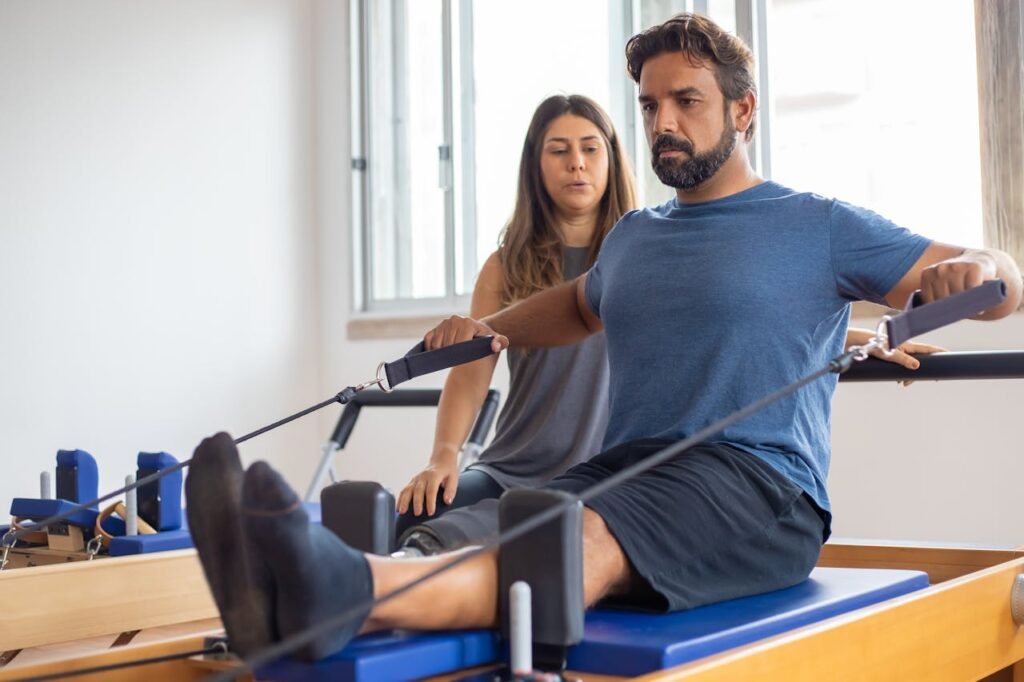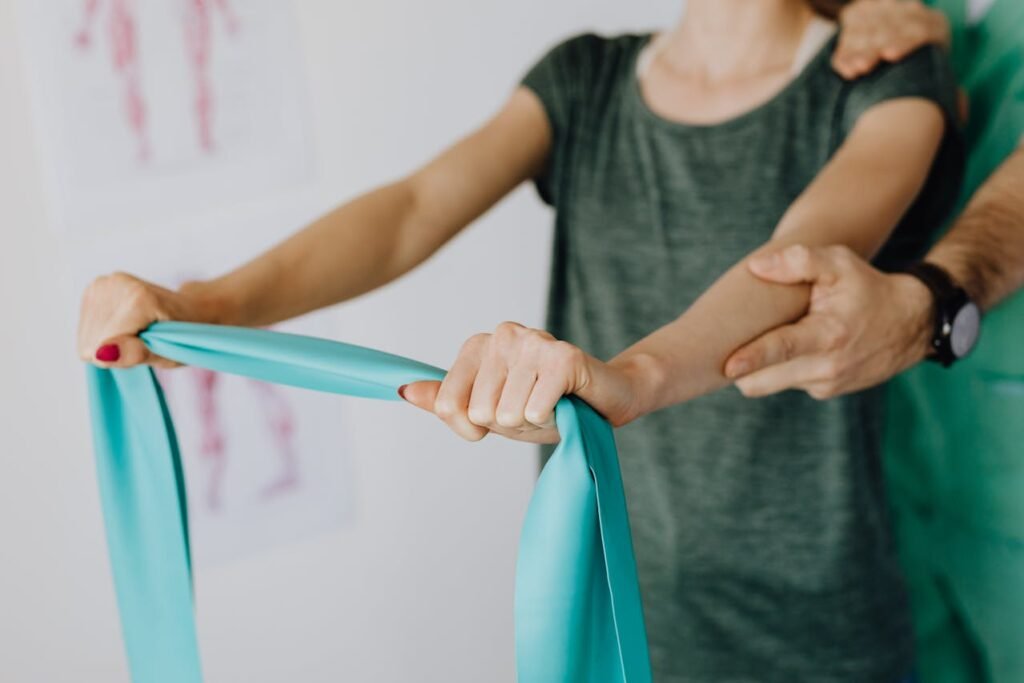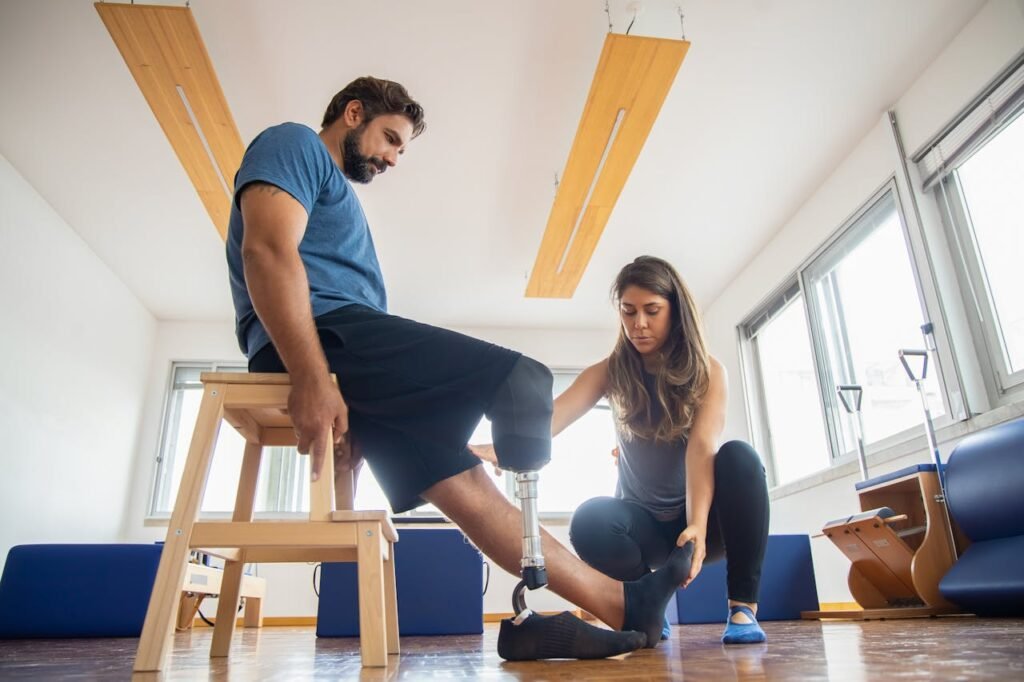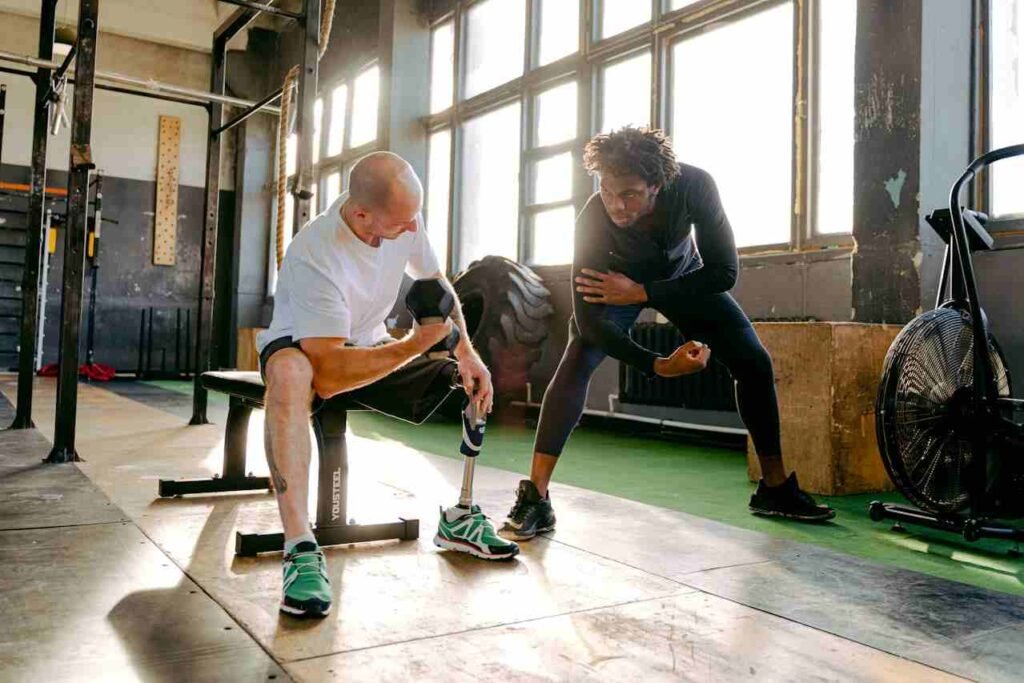Staying active is vital for overall health and well-being, but for individuals with disabilities, finding fitness programs that are truly accessible can be challenging. Fortunately, fitness is not one-size-fits-all. With adaptive exercises, inclusive gyms, and innovative programs, staying active with a disability is more achievable than ever. Fitness isn’t just about physical health—it’s a pathway to greater independence, confidence, and connection with others.
This article explores accessible fitness programs, strategies for overcoming barriers, and how to find or create a fitness routine tailored to your needs. Whether you’re a beginner or a seasoned athlete, staying active is possible with the right resources and mindset.
The Importance of Accessible Fitness
Fitness plays a transformative role in every individual’s life. For people with disabilities, staying active can improve not just physical health but also emotional well-being and social connections.
Physical Health Benefits
Regular exercise strengthens muscles, improves cardiovascular health, and boosts overall endurance. For individuals with limited mobility, targeted exercises can improve flexibility, reduce joint stiffness, and enhance functional strength for everyday tasks.
For example, a wheelchair user might engage in resistance band workouts to strengthen their upper body, which can improve mobility and independence.
Similarly, aquatic therapy can provide a low-impact option for individuals with arthritis or other conditions that limit weight-bearing activities.
Physical activity also helps manage chronic conditions like diabetes, obesity, and high blood pressure, which can disproportionately affect individuals with disabilities due to limited opportunities for movement.

Mental and Emotional Benefits
Exercise is a powerful stress reliever, releasing endorphins that improve mood and reduce anxiety. For people with disabilities, fitness programs tailored to their needs can boost confidence and foster a sense of accomplishment.
For example, adaptive yoga combines mindfulness and movement, helping individuals manage stress while improving physical flexibility. Similarly, joining an inclusive fitness class can provide a sense of belonging and reduce feelings of isolation.
Social interaction is another key benefit of accessible fitness programs. Working out in a supportive environment fosters connections and builds community, which is particularly valuable for individuals who may face barriers to participation in other social activities.
Overcoming Barriers to Fitness
Despite the many benefits of staying active, individuals with disabilities often encounter physical, social, and psychological barriers to fitness. Identifying and addressing these obstacles is the first step toward creating a sustainable fitness routine.
Accessibility Challenges
Many traditional gyms and fitness centers are not designed with accessibility in mind. Narrow spaces, inaccessible equipment, and a lack of staff training can make these environments unwelcoming or even unsafe.
Inclusive fitness centers are changing this narrative by offering equipment designed for wheelchair users, adjustable machines for varying heights and ranges of motion, and trainers skilled in adaptive techniques.
When searching for a fitness center, look for facilities with features like wide aisles, ramps, and accessible restrooms to ensure a comfortable experience.
If an accessible gym isn’t available in your area, consider creating a home workout space with adaptive equipment. Resistance bands, hand weights, and yoga mats are versatile tools that can be used in various seated or standing exercises.
Online fitness programs specifically designed for individuals with disabilities can also bridge the gap, providing expert guidance from the comfort of home.
Addressing Psychological Barriers
Fear of judgment or self-doubt often prevents individuals with disabilities from pursuing fitness programs. This hesitation can stem from a lack of representation in mainstream fitness spaces or past experiences with inaccessible environments.
Building confidence starts with finding a supportive community. Adaptive sports teams, inclusive workout groups, and disability advocacy organizations often host fitness events designed to encourage participation in a judgment-free setting.
Starting with small, achievable goals can also help build momentum and reduce feelings of intimidation.
Financial Barriers
The cost of fitness programs, equipment, or specialized trainers can be a significant obstacle for individuals with disabilities. Adaptive equipment, such as hand cycles or wheelchair-accessible treadmills, often comes with a higher price tag, and not all insurance plans cover these expenses.
To address financial challenges, consider exploring community-based fitness programs or local disability organizations that offer free or subsidized options.

Many nonprofit groups provide access to adaptive sports equipment or offer scholarships for inclusive fitness classes. Additionally, virtual fitness programs can be a cost-effective alternative, providing expert guidance without the expense of a gym membership.
Businesses and organizations can also play a role by sponsoring adaptive fitness programs or donating equipment to community centers. These initiatives not only make fitness more accessible but also demonstrate a commitment to inclusivity and social impact.
Finding the Right Fitness Program
Staying active starts with finding a program that aligns with your goals, preferences, and abilities. Accessible fitness programs come in many forms, from adaptive sports leagues to individualized training sessions.
Adaptive Fitness Classes
Adaptive fitness classes are designed specifically for individuals with disabilities, offering modified exercises that accommodate a wide range of abilities. Examples include seated aerobics, wheelchair dance, and adaptive yoga.
These classes often prioritize inclusivity, creating a welcoming environment where participants can engage at their own pace.
Look for local community centers, gyms, or disability advocacy groups that host adaptive fitness programs. Many of these classes are led by instructors with expertise in working with individuals with disabilities, ensuring a safe and supportive experience.
Inclusive Gym Memberships
Some gyms and fitness centers are embracing inclusivity by offering memberships tailored to individuals with disabilities. These facilities often feature accessible equipment, such as adjustable weight machines, hand ergometers, and accessible treadmills.
When considering a gym membership, ask about accessibility features and staff training. A gym with knowledgeable trainers who understand adaptive fitness techniques can provide valuable guidance in building a customized workout plan.
Virtual Fitness Programs
Virtual fitness programs have grown significantly in popularity, providing individuals with disabilities the flexibility to work out from home. Platforms like YouTube, Zoom, and fitness apps offer a wide range of adaptive workouts, from strength training to guided meditation.
These programs are particularly beneficial for individuals in rural areas or those with limited transportation options. Many online fitness communities also offer live classes and interactive features, allowing participants to connect with others and build a sense of camaraderie.
The Role of Businesses in Promoting Accessible Fitness
Businesses have a unique opportunity to support accessible fitness initiatives, both as service providers and community advocates. By prioritizing inclusivity, businesses can expand their reach, foster loyalty among diverse customer bases, and contribute to a healthier society.
Designing Accessible Equipment
Fitness equipment manufacturers can lead the charge by designing machines that accommodate a wide range of users. Adjustable resistance levels, accessible seating, and ergonomic designs are just a few features that make equipment more inclusive.
Collaboration with individuals with disabilities during the design process ensures that products meet real-world needs. Businesses that prioritize accessibility in their products not only attract new customers but also set themselves apart as leaders in innovation and inclusivity.
Supporting Community Programs
Businesses can amplify their impact by partnering with local organizations to support adaptive fitness programs. Sponsoring events like inclusive marathons, adaptive sports leagues, or fitness workshops creates opportunities for individuals with disabilities to stay active while strengthening community connections.
For example, a local business might sponsor a wheelchair basketball tournament, providing funding for equipment, facilities, and prizes. These initiatives not only make fitness more accessible but also demonstrate the business’s commitment to social responsibility.

Enhancing Accessibility in Fitness Centers
Businesses that operate gyms or fitness centers can promote accessibility by redesigning their spaces to accommodate individuals with disabilities. This includes wide, unobstructed pathways, ramps, elevators, and accessible restrooms.
Installing adaptive equipment, such as resistance bands with loop handles, adjustable benches, or recumbent bikes, can make the space welcoming to a broader range of users.
Staff training is equally critical. Gym employees should be educated on how to assist individuals with disabilities respectfully and effectively. This might include understanding the use of adaptive equipment, modifying exercises, or providing spot assistance.
Businesses that prioritize accessibility and inclusivity often find that these efforts not only attract a more diverse clientele but also build a strong reputation in the community.
Staying Active with Adaptive Sports
For individuals with disabilities, adaptive sports offer an exciting and empowering way to stay active. These sports are tailored to various abilities, using modified rules or equipment to ensure participation. Beyond physical benefits, adaptive sports foster teamwork, build confidence, and provide opportunities for competition and camaraderie.
Exploring Adaptive Sports
Sports like wheelchair basketball, seated volleyball, and adaptive cycling are popular options for individuals with physical disabilities. These activities promote cardiovascular fitness, strength, and coordination while fostering a sense of accomplishment.
For individuals with visual impairments, sports like goalball or blind soccer use sound-based cues, allowing players to rely on auditory skills to compete.
Similarly, individuals with intellectual disabilities can participate in programs like Special Olympics, which offer a range of athletic opportunities tailored to their abilities.
Local adaptive sports leagues or national organizations often host events and training programs, making it easier for participants to get involved. For those new to adaptive sports, starting with recreational activities or beginner-level programs can help build skills and confidence.
Building a Community Through Sports
Adaptive sports create a sense of belonging and community, as participants bond over shared experiences and challenges. Many individuals find that these activities provide a supportive environment where they can push their limits and celebrate achievements.
Businesses can support adaptive sports by sponsoring teams, donating equipment, or volunteering at events. These partnerships not only increase visibility for adaptive programs but also highlight the business’s commitment to fostering inclusivity and active living.
Setting Realistic Fitness Goals
Creating a sustainable fitness routine requires setting realistic and achievable goals. For individuals with disabilities, these goals should be tailored to their unique needs and abilities, focusing on progress rather than perfection.
Customizing Your Fitness Plan
Every fitness journey is unique, and what works for one person may not work for another. Working with a physical therapist, trainer, or adaptive fitness coach can help identify exercises that align with your goals and abilities. These professionals can also provide guidance on avoiding overexertion or injury.
For example, a person with limited upper-body mobility might focus on exercises that target their legs and core, while someone with lower-body limitations could emphasize arm strength and flexibility. Breaking larger goals into smaller milestones helps maintain motivation and track progress over time.

Embracing a Holistic Approach
Fitness is about more than physical activity. A holistic approach that incorporates proper nutrition, mental well-being, and adequate rest ensures a balanced lifestyle. For individuals with disabilities, these factors play an even greater role in overall health.
Incorporating mindfulness practices, such as yoga or meditation, can reduce stress and enhance focus, while a diet rich in nutrients supports energy levels and recovery.
Staying consistent with your routine, even if it means starting with just a few minutes of activity per day, builds habits that contribute to long-term health.
Leveraging Technology to Stay Active
In today’s digital age, technology has revolutionized the way individuals approach fitness, particularly for those with disabilities. From wearable devices to adaptive fitness apps, these tools make staying active more accessible than ever.
Wearable Technology
Devices like fitness trackers or smartwatches help individuals monitor their activity levels, heart rate, and progress toward fitness goals. For wheelchair users, specialized trackers like the Apple Watch’s wheelchair mode provide metrics tailored to push-based movement, ensuring accuracy and relevance.
These tools not only offer motivation but also help users understand their physical limits and adjust their routines accordingly. By tracking progress over time, individuals can celebrate their achievements and identify areas for improvement.
Adaptive Fitness Apps
Fitness apps designed with accessibility in mind provide guided workouts, progress tracking, and adaptive exercise plans. Platforms like Evolve21 or Special Strong cater specifically to individuals with disabilities, offering video tutorials and personalized coaching that can be accessed from home.
For those who thrive on social interaction, apps with virtual workout communities or live-streamed classes create opportunities to connect with others and build accountability.
Businesses can partner with these apps to promote inclusive content or sponsor memberships for individuals who face financial barriers.
The Role of Rehabilitation and Therapy in Accessible Fitness
For individuals with disabilities, fitness often intersects with rehabilitation and therapy. These programs not only focus on physical recovery but also serve as a gateway to long-term active lifestyles. Combining therapeutic exercises with accessible fitness routines ensures a holistic approach to health and well-being.
Rehabilitation as a Starting Point
Rehabilitation programs are designed to help individuals regain strength, mobility, and function after an injury, surgery, or diagnosis. For someone with a disability, these programs often lay the foundation for a sustainable fitness routine.
For example, someone who has recently started using a prosthetic limb may work with a physiotherapist to master basic movements. These sessions could then transition into strength-building exercises that enhance their ability to walk, climb stairs, or perform daily tasks independently.
Rehabilitation centers increasingly integrate adaptive fitness equipment and inclusive practices into their programs. This allows individuals to seamlessly transition from recovery to active living, fostering confidence and independence.

Combining Fitness with Therapy
Therapeutic activities, such as aquatic therapy or functional training, can double as accessible fitness options. Aquatic therapy is particularly beneficial for individuals with joint pain, paralysis, or balance issues, as the buoyancy of water reduces strain while providing resistance for muscle strengthening.
Functional training, on the other hand, focuses on movements that mimic real-life tasks. For example, exercises that simulate lifting groceries or transferring from a wheelchair to a chair improve both physical fitness and daily independence.
By incorporating these therapeutic activities into a broader fitness plan, individuals can address specific physical needs while enjoying the benefits of staying active.
Promoting Accessible Fitness in Schools and Workplaces
Creating environments that encourage accessible fitness is essential for fostering inclusion in schools and workplaces. These settings play a pivotal role in shaping attitudes toward disability and fitness, and proactive measures can ensure that everyone has the opportunity to stay active.
Inclusive Fitness in Schools
For students with disabilities, physical education (PE) classes can either be empowering or exclusionary, depending on how they are structured. Inclusive PE programs adapt activities to accommodate diverse abilities, ensuring that all students can participate meaningfully.
For example, a school might modify a traditional game of basketball to include both wheelchair users and ambulatory players, emphasizing teamwork and fun over competition. Teachers trained in adaptive techniques can create exercises that challenge students without overwhelming them, fostering a positive attitude toward fitness.
Extracurricular programs, such as adaptive sports teams or after-school yoga classes, provide additional opportunities for students to explore fitness. These initiatives not only promote physical health but also help students build social connections and confidence.
Supporting Fitness in the Workplace
Workplaces that prioritize accessible fitness create healthier, more inclusive environments. On-site gyms equipped with adaptive equipment, standing desks, or ergonomic furniture make it easier for employees with disabilities to stay active.
Employers can also organize wellness initiatives that cater to diverse needs. Virtual fitness challenges, group workout sessions, or partnerships with local gyms offering adaptive programs demonstrate a commitment to employee well-being.
For remote employees, offering memberships to virtual fitness platforms ensures that accessibility is not limited by location. Employers that integrate these measures into their workplace culture often see improved morale, productivity, and retention.
Empowering Individuals Through Education
Education is a critical component of accessible fitness. By empowering individuals with the knowledge and tools to create effective routines, we can ensure that fitness becomes a lifelong habit rather than a short-term goal.
Raising Awareness
Many individuals with disabilities are unaware of the fitness options available to them. Awareness campaigns, workshops, and online resources can bridge this gap by highlighting adaptive sports, inclusive gyms, and virtual programs.
For example, a local community center could host an open house showcasing its accessible fitness equipment and adaptive classes. Social media campaigns featuring testimonials from individuals who have benefited from these programs can also inspire others to explore fitness.
Training Professionals
Fitness professionals play a crucial role in creating inclusive environments. By training trainers, physiotherapists, and instructors in adaptive techniques, we can ensure that individuals with disabilities receive the support they need.
Certification programs for adaptive fitness professionals, such as those offered by Special Strong or Adaptive Training Academy, equip trainers with the skills to design safe and effective workouts.
Businesses that invest in these certifications for their staff demonstrate a commitment to inclusion and quality service.

Conclusion
Accessible fitness programs empower individuals with disabilities to embrace active lifestyles, improving both physical and emotional well-being.
From adaptive sports to virtual fitness platforms, the options available today are more diverse and inclusive than ever before. By addressing barriers, promoting education, and fostering supportive communities, we can ensure that fitness is accessible to all.
For businesses, prioritizing accessible fitness is not just a moral imperative—it’s an opportunity to lead with purpose.
By designing inclusive spaces, supporting community programs, and collaborating with adaptive fitness experts, companies can play a vital role in creating a healthier, more equitable world.
At Robobionics, we are dedicated to empowering individuals through innovation and inclusivity. Our prosthetics, like Grippy™, are designed to restore independence and enable users to participate fully in life’s activities, including fitness.



